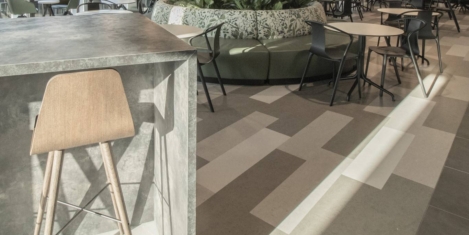To provide the best experiences, we use technologies like cookies to store and/or access device information. Consenting to these technologies will allow us to process data such as browsing behaviour or unique IDs on this site. Not consenting or withdrawing consent, may adversely affect certain features and functions.
The technical storage or access is strictly necessary for the legitimate purpose of enabling the use of a specific service explicitly requested by the subscriber or user, or for the sole purpose of carrying out the transmission of a communication over an electronic communications network.
The technical storage or access is necessary for the legitimate purpose of storing preferences that are not requested by the subscriber or user.
The technical storage or access that is used exclusively for statistical purposes.
The technical storage or access that is used exclusively for anonymous statistical purposes. Without a subpoena, voluntary compliance on the part of your Internet Service Provider, or additional records from a third party, information stored or retrieved for this purpose alone cannot usually be used to identify you.
The technical storage or access is required to create user profiles to send advertising, or to track the user on a website or across several websites for similar marketing purposes.
 People who involuntarily lose their job early in their career have poorer health in later life, according to new findings from the University of Kent in the UK and the University of Bamberg in Germany. Researchers, including Dr Olena Nizalova from the Centre for Health Service Studies (CHSS) within the School of Social Policy, Sociology and Social Research (SSPSSR) at Kent, set out to establish what the long-term implications of enforced unemployment are on individuals over the course of their life, particularly in later life.
People who involuntarily lose their job early in their career have poorer health in later life, according to new findings from the University of Kent in the UK and the University of Bamberg in Germany. Researchers, including Dr Olena Nizalova from the Centre for Health Service Studies (CHSS) within the School of Social Policy, Sociology and Social Research (SSPSSR) at Kent, set out to establish what the long-term implications of enforced unemployment are on individuals over the course of their life, particularly in later life.












 Huge numbers of employees have or have had access to mission critical company systems which should be reserved only for staff that require it, claims a new study by CyberArk. Specifically, it found that almost half (48 percent) of employees have or have had access to sensitive financial documents; 46 percent to confidential HR information; nearly a third (29 percent) have or have had direct access to company bank account and over a third (37 percent) access to research and development plans or blueprints for new products/services. Credential theft remains the most common and effective route to a successful cyber-attack.
Huge numbers of employees have or have had access to mission critical company systems which should be reserved only for staff that require it, claims a new study by CyberArk. Specifically, it found that almost half (48 percent) of employees have or have had access to sensitive financial documents; 46 percent to confidential HR information; nearly a third (29 percent) have or have had direct access to company bank account and over a third (37 percent) access to research and development plans or blueprints for new products/services. Credential theft remains the most common and effective route to a successful cyber-attack.






 Given the latest U turn regarding Brexit, with beleaguered British Prime Minister Theresa May announcing the cancellation of a commons vote on the agreement, a new report into the so called “glass cliff” appointment of women is pretty timely. The term “glass cliff” was coined by researchers Ryan and Haslam in the early 2000s to describe a phenomenon in which women are more likely than men to be promoted to precarious management positions with a higher risk of failure. Aside from May, exemplar cases often used to support the theory include Marissa Mayer, former CEO of Yahoo and Andrea Nahles, Social Democrat party leader in the German Bundestag.
Given the latest U turn regarding Brexit, with beleaguered British Prime Minister Theresa May announcing the cancellation of a commons vote on the agreement, a new report into the so called “glass cliff” appointment of women is pretty timely. The term “glass cliff” was coined by researchers Ryan and Haslam in the early 2000s to describe a phenomenon in which women are more likely than men to be promoted to precarious management positions with a higher risk of failure. Aside from May, exemplar cases often used to support the theory include Marissa Mayer, former CEO of Yahoo and Andrea Nahles, Social Democrat party leader in the German Bundestag. 
 Technology is in the process of transforming almost every aspect of society, with change happening at an “accelerating rate,” and this is being made possible due of simultaneous rapid advances in several key areas of technology. This is according to a new White Paper on
Technology is in the process of transforming almost every aspect of society, with change happening at an “accelerating rate,” and this is being made possible due of simultaneous rapid advances in several key areas of technology. This is according to a new White Paper on 









January 4, 2019
Why new technology can still make employees happier, healthier and more efficient
by Elaine Rossall • AI, Comment, Flexible working, Lighting, Technology, Wellbeing
For many years, we became used to new technology being treated with excitement. Essentially, people thought technology made their lives better. More recently this consensus has been tested. On a very practical level, there is growing concern about the impact of everyday technology. ‘Screen-time’ has become a byword for anxiety and disengagement from the real world. Meanwhile, there is trepidation about the impact of future technology, such as the automation of jobs. Whilst caution is needed, there is a danger that we are forgetting the many benefits technology can bring. As an example, look to the workplace. Already, offices are gaining hugely from technology that benefits employee wellness and productivity. However, we have only just begun to feel its impact. A ‘fast’ office may sound like an oxymoron. A building isn’t going to win a 100-metre race. Yet fast offices, which allow employees to control their immediate environment, are becoming increasingly common.
(more…)